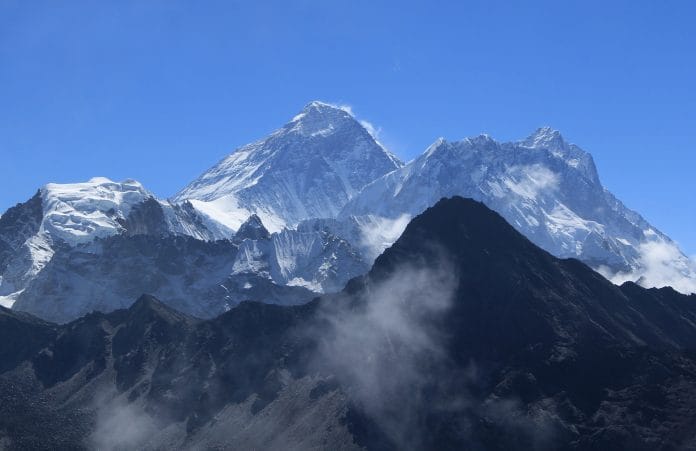New Delhi: The Nepal government has initiated an inquiry against three Indian climbers over allegations that they faked claims of summiting Mount Everest on 26 May.
Vikas Rana, Shobha Banwala and Ankush Kasana of Haryana, who returned to a grand welcome in each of their hometowns, have been asked to furnish “documentary proof” of reaching the peak of Mount Everest.
The inquiry came after The Himalayan Times, a Kathmandu-based daily, claimed the three had not even crossed Camp 3, the penultimate rest stop over 1,300 metres below the summit.
The newspaper claimed to have based its conclusions on several factors: None of the three could produce a photo clicked on the peak, the sherpas, who have to mandatorily accompany each climber, did not vouch for the claim, and Nepal’s Department of Tourism (DoT), the final arbiter, has still not given a certificate to the three.
According to the report, when the three were asked the names of their sherpas, they couldn’t recall them either. The trio claimed they and their four sherpas were the only people who climbed Everest on 26 May, the report added.
DoT director Meera Acharya told ThePrint that they had asked the three climbers to provide them with photographs, videos and any other evidence backing their claim of having reached the summit.
“We have also contacted the travel agency… whose clients the three were, as well as the sherpas who accompanied them to the summit, and asked them to spill out the facts,” she said. “We will give our verdict in next few days.”
The alleged fake claim has since caught the notice of Everest enthusiasts, with a popular blog run by American mountaineer Alan Arnette carrying the headline “Indians Fake their Summit Claim”.
For India, which accounts for the largest number of Everest summiteers after the US every year, it’s an avoidable controversy. It was just two years ago that two climbers who claimed to be the first Indian couple on the Everest peak were found to have faked their claim.
Also read: At one point I thought I would die, says Mumbai man who survived Everest ‘traffic jam’
‘Too early to castigate the climbers’
The Indian Mountaineering Federation (IMF), incensed by the row, has stepped in, saying they want the authority to certify Indian climbers’ summiting feats.
“We are seriously contemplating approaching the Indian government,” said IMF president Colonel H.S. Chauhan (retired).
“We would like to have a say in authenticating successful climbs by Indian nationals,” he added.
Chauhan said it was too early to castigate the three climbers as the facts of the case had still not been fully established.
‘A ticket to brand name’
Whatever the result of the Nepalese inquiry, experts say the fact couldn’t be denied that mountaineering is no longer the spiritual pursuit it used to be, with many treating the Everest as a highway to fame.
“Climbing Everest is no longer the culmination of a deeply-cultivated desire. In these days of frenetic social media activity, it’s a ticket to brand name and recognition,” said Chauhan.
Anup Shah, a nature photographer and mountaineer who won the Padma Shri this year, lamented that the thrill of crossing high passes was now replaced by a lust to cover the most number of passes in the shortest time.
“We may have gained more Facebook friends with our photographs, but have lost the magical feeling that brought us close to the mountains in the first place,” he said.
“Love of climbing a mountain as an act of spiritual exercise is now a rare trait among mountaineers,” he added.
However, Aditya Gupta, who scaled Everest on 22 May, said while more people were attempting the Everest climb, which involves the purchase of a licence worth Rs 8 lakh, it didn’t diminish the hard work required to pull it off.
“More and more people,” said Gupta, “are running marathons now. Does this make marathons any easier? Same for Everest climbing.
“Socio-economic changes and the need for recognition are bringing more people to the Everest. What is wrong with it?” he added. “These changes cannot be undone.”
The author is a senior journalist and filmmaker who writes on environment and wildlife
Also read: Liquor bottles & food cans among 11,000 kg of trash found on Mt Everest







Why fake when you can do it.. cause as far I know Vikas Rana is a strong woman… disappointed… am sure you have reasons but please clear your name and complete your task…
Feku culture is growing by leaps and bounds in India
The mad rush to climb Everest is hurting the natural environment. Garbage everywhere!
That is very Indian thing if cheating and boasting…
I agree with Anup Sah “Love of climbing a mountain as an act of spiritual exercise is now a rare trait among mountaineers.” Mountain climbing is also about knowing and loving mountains. Its not a physical exercise like running a marathon as Aditya Gupta claims. Climbing is a tough experience even if pushed and pulled by half a dozen guides for lakhs of Rupees. Not one of the cheeky money throwing Everesters of these days can detect the many moods of a mountain, read the skies for news about weather and not their mobiles, or spend time waiting for a sunset or a sunrise. This is not mountaineering. This is costly self promotion for the flickering fame of 1 minute fame. Who remembers the names of those who climbed Everest commercially even last year?